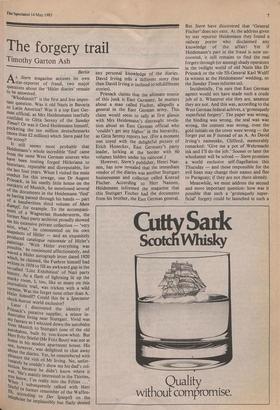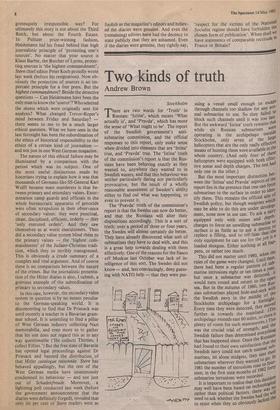The forgery trail
Timothy Garton Ash
Berlin As Stern magazine accuses its own star-reporter of fraud, two major questions about the 'Hitler diaries' remain to be answered. 'Whodunnit?' is the first and less impor- tant question. Was it old Nazis in Bavaria or Latin America? Was it a top East Ger- man official, as Mrs Heidenmann tearfully confided to Gitta Sereny of the Sunday Times? Or was it Gerd Heidemann himself, Pocketing the ten million deutschemarks (More than £2 million) which Stern paid for the scoop? It still seems most probable that Heidernarin's whole incredible 'find' came from the same West German sources who have been touting forged Hitleriana to historians, reputable and disreputable, for the last four years. When I visited the main conduit for this sewage, one Dr August Priesack, in his smelly little house on the outskirts of Munich, he mentioned several Of the documents in the Heidemann 'find' as having passed through his hands — part of a handwritten third volume of Mein • kamPf, for example. To the accompani- ment of a Wagnerian thunderstorm, the former Nazi party archivist proudly showed Me his extensive private collection — 'very nice, what,' he commented on his own snapshots of Hitler — and an exquisitely Produced catalogue raisonnee of Hitler's Paintings. 'With Hitler everything was Possible,' he reminisced affectionately, and waved a Hitler autograph letter dated 1920 Which, he claimed, the Fuehrer himself had written in 1936 to fill an awkward gap in the so-called 'Linz Exhibition' of Nazi party history. As a flash of lightning lit up the murky room, I, too, like so many on this journalistic trail, was tricken with a wild surmise. Was the forger none other than A. Hitler himself? Could this be a Spectator shock-horror world exclusive?
Later I discovered the identity of Priesack's putative supplier, a minor in- dustrialist living near Stuttgart. Vivid was
fantasy as I whizzed down the autobahn from Munich to Stuttgart (one of the old autobahns, built by you-know-who). But ,Herr Fritz Stiefel (Mr Fritz Boot) was not at "me in his modest apartment house. His SO n, however, was delighted to chat away about the diaries. Yes, he remembered with Pleasure the visit of Mr Irving. No, unfor- tunately he couldn't show me his dad's col- lection because he didn't know where it as- 'He's mainly interested in the Thirties, You know, I'm really into the Fifties . • ,,w.hen I subsequently talked with Herr (a former remember of the Waffen- n according to Der Spiegel) on the telephone he implausibly but flatly denied
any personal knowledge of the diaries. David Irving tells a different story (but then David Irving is inclined to telLdifferent stories).
Priesack claims that the ultimate source of this junk is East Germany, he mutters about a man called Fischer, allegedly a general in the East German army. This claim would seem to tally at first glance with Mrs Heidemann's distraught revela- tion about an East German official who 'couldn't get any higher' in the hierarchy, as Gitta Sereny reports her. (For a moment one toyed with the delightful picture of Erich Honecker, East Germany's party leader, lurking at the border with 60 volumes hidden under his raincoat.)
However, Stern's publisher, Henri Nan- nen, has now revealed that the immediate vendor of the diaries was another Stuttgart businessman and collector called Konrad Fischer. According to Herr Nannen, Heidemann informed the magazine that this Stuttgart Fischer had the documents from his brother, the East German general. But Stern have discovered that 'General Fischer' does not exist. At the address given by star reporter Heidemann they found a railway porter who disclaimed any knowledge of the affair! Yet if Heidernann's part in the fraud is now un- covered, it still remains to find the real forgers through (or among) shady operators in the twilight world of old Nazis like Dr Priesack or the vile SS-General Karl Wolff (a witness at the Heidemanns' wedding, so the Sunday Times informs us).
Incidentally, I'm sure that East German agents would not have made such a crude job of it. Whatever else they are, amateur they are not. And this was, according to the West German federal achives, a 'grotesquely superficial forgery'. The paper was wrong, the binding was wrong, the seal wax was wrong, the content was wrong, even the gold initials on the cover were wrong — the forger put an F instead of an A. As David Irving's namesake, Clifford, memorably remarked: 'Give me a pot of Wehrmacht ink and I'll do the job.' Sooner or later the whodunnit will be solved — Stern promises a world exclusive self-flagellation this Thursday — and those responsible for the evil hoax may change their names and flee to Paraguay; if they are not there already.
Meanwhile, we must address the second and more important question: how was it possible that such a `grotesquely super- ficial' forgery could be launched in such a
grotesquely irresponsible way? For ultimately this story is not about the Third Reich, but about the Fourth Estate. In Pulitzer prize-winning fashion, Heidemann hid his fraud behind that high journalistic principle of 'protecting one's sources'. No matter that your source is Klaus Barbie, the Butcher of Lyons, protec- ting sources is 'the highest commandment', Stern chief editor Peter Koch proudly wrote
last week (before his resignation). Now ob- ., musty the protection of sources is an im-
portant principle for a free press. But the highest commandment? Beside the detective questions — Can Heidemann have been the only man to know the 'source'? Who selected the sheets which were originally sent for analysis? What changed Trevor-Roper's mind between Friday and Saturday? — there seems to me to be a much larger ethical question. What we have seen in the last fortnight has been the subordination of the ethics of historical responsibility to the ethics of a certain kind of journalism — and not just in one West German magazine.
The nature of this ethical failure may be illuminated by a comparison with the period which was its subject. One of the most useful distinctions made by historians trying to explain how it was that thousands of Germans like SS-General Karl Wolff became mass murderers is that be- tween primary and secondary values. Exter- mination camp guards and officials in the whole bureaucratic apparatus of genocide were often scrupulous in their observance of secondary values: they were punctual, clean, disciplined, efficient, orderly — they 'only executed orders'. And they saw themselves as at worst executioners. Thus did a secondary value system blind them to the primary values — the 'highest com- mandments' of the Judaeo-Christian tradi- tion, which they so terribly transgressed. This is obviously a crude summary of a complex and vital argument. And of course there is no comparison between the nature of the crimes. But the journalistic presenta- tion of the Hitler diaries is also, I submit, a grievous example of the subordination of primary to secondary values.
In this case, however, the secondary value system in question is by no means peculiar to the German-speaking world. It is disconcerting to find that Dr Priesack was until recently a teacher in a Bavarian gram- mar school. It is unsettling to find a pillar of West German industry collecting Nazi memorabilia, and even more so to gather that his son does not regard this as in any way questionable ('He collects Thirties, I collect Fifties.') But the free state of Bavaria has opened legal proceedings against Dr Priesack and banned the distribution of that Hitler catalogue raisonnee. Stern has behaved appallingly, but the rest of the West German media have unanimously condemned its behaviour — and not just out of Schadenfreude. Moreover, a lightning poll conducted last week (before the government announcement that the diaries were definitely forged), revealed that only six per cent of Stern readers were as
foolish as the magazine's editors and believ- ed the diaries were genuine. And even the (remaining) editors have had the decency to state publicly that they are ashamed. Even if the diaries were genuine, they rightly say, 'respect for the victims of the National Socialist regime should have forbidden the chosen form of publication'. When shall we have statements of comparable rectitude la France or Britain?











































 Previous page
Previous page